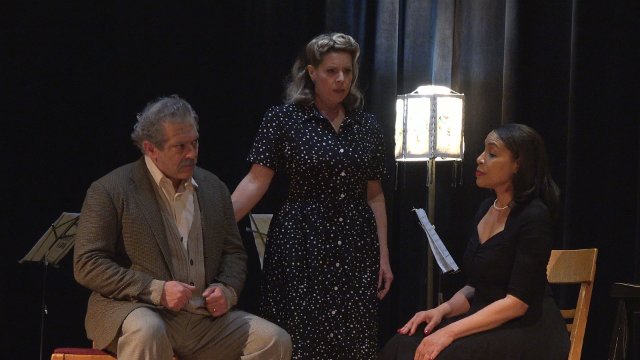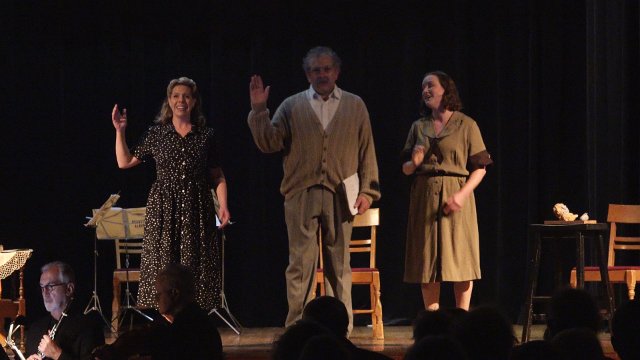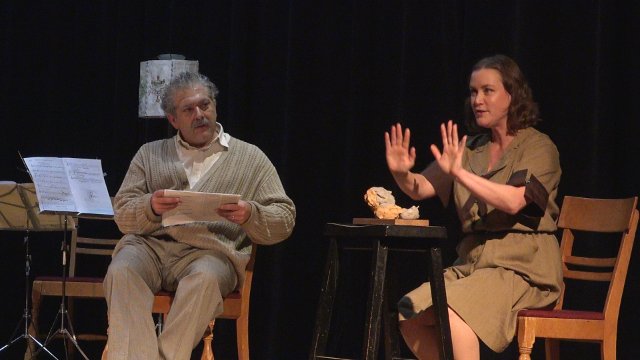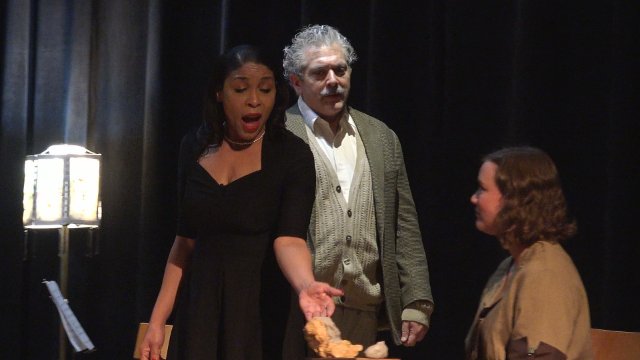Einstein at Princeton
Opera Seen Through Domestic Prism
By: Victor Cordell - Dec 08, 2023
Renowned scientists are often said to be aloof and austere. By many accounts, perhaps the most famous and impactful modern scientist, Albert Einstein, had his flaws but was noted as being a mensch, with a great sense of humanity. With their tenth collaboration, composer Allen Shearer and librettist Claudia Stevens have premiered a one-act chamber opera honoring the great physicist in a small but poignant way, demonstrating that profound matters can be distilled into small vessels.
The overarching topic and the sub-themes seem teleologically selected by Stevens. The opera is comprised of three scenes that appear to draw on the librettist’s reflections on her background as a daughter of refugees from Hitler's Europe. In a compact manner, it demonstrates the idealism of Einstein contrasted with the pragmatism of the women around him, while the story line covers political and social commentary; God and existence; the enormity of the creation of the atomic bomb; and more.
Einstein played the violin for pleasure. Music was very important to him, perhaps as an escape, including his Wednesday night get-togethers with other amateur musicians. In this context, Shearer gets to sprinkle his own delightful and accessible music with borrowings from other composers, namely excerpts from Haydn and Beethoven string quartets, in which members of the chamber orchestra go on stage to perform with Einstein.
The title character is performed admirably by warm-voiced baritone Nikolas Nackley who captures a part of Einstein’s character, his concerns, and his groundedness. The opera opens in 1941, with Einstein, his secretary Helene, and his stepdaughter Margot – the women beautifully sung and played by sopranos Angela Cadelago and Julie Hathaway respectively. Each one Jewish, the three characters have just become U.S. citizens and relish the freedom from oppression and fear for life under the Nazi Holocaust. But perhaps in a nod to the current threat to democracy posed by the possibility of a second Trump administration, a cautionary alert is also raised along with their appreciation for new lives.
Tying into the notion that this country has always been a less-than-perfect union, a flashback to 1937 occurs. A stoic Marian Anderson has just performed in Princeton but was denied a room at the local inn because she is Black. Einstein welcomes her to stay in his home, with all asking how such a great country could allow such prejudice to persist. The emotional highlight of the evening is when Anderson is asked to sing. Mezzo Lori Willis, who plays the great singer, gives a wonderful a cappella rendition of “He’s Got the Whole World in His Hands.”
A third solemn topic is the discussion of the nuclear bomb. Einstein was instrumental in its theoretical conceptualization and influential in the decision to develop and deploy it. But he suffered from remorse and raised existential questions about how a loving God could allow it to happen.
In composing the score, Shearer faced an extra challenge in orchestration. He and Stevens proposed to Berkeley Chamber Performances inviting the touring group Strata, a trio of violin/viola, clarinet, and piano, to perform on the same bill before intermission, while they would be included in the opera’s chamber orchestra as well. Trio Solano, a Bay Area group comprised of violin, viola, and cello, would fill out the opera’s orchestra. Shearer worked adeptly within this self-imposed configuration to produce a sound suited to the libretto. Jonathan Khuner deftly conducted the instrumental and voice ensembles, including the eccentric movement of musicians back and forth between pit and stage to perform as members of the amateur quartet.
The score would probably be categorized as postmodern, meaning that sweeping Romantic melodies are eschewed. If not memorable, the score suits the nature of the interchange, which is conversation among friends and family, so vocal challenges of range and volume are limited. Quotes from Haydn, Mozart, and Beethoven chamber music comprise a significant contribution to the score and its effect. But the score also contains emotion and jocularity. In one case, when Einstein says that he hopes the new cellist in their amateur group will play in tune, the cellist in the orchestra responds with a sad sounding downward glissando, which the audience responded to with laughter.
As weighty as some of the topics in the libretto are, the overall feeling is far from downcast. Indeed, at the end, and after some distractions, Einstein returns to physics. Separately, the women conclude that life is limited and appear to accept that what will be will be.
“Einstein at Princeton,” a world premiere opera, composed by Allen Shearer with libretto by Claudia Stevens is produced by Berkeley Chamber Performances and performed at Berkeley City Club, 2315 Durant Avenue, Berkeley, CA, December 5, 2023.





